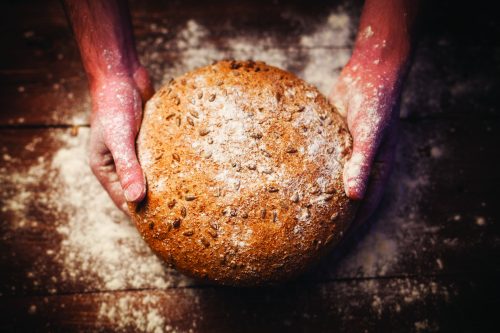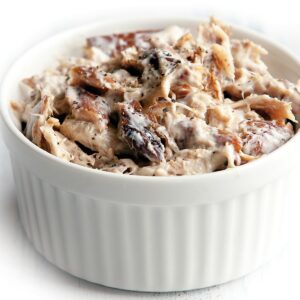
In the quest to improve health, resolve gut issues and lose weight, many Kiwis have cut out all wheat, rye, barley and oats — but is it necessary and is it healthy? Dietitian Dave Shaw explains why going gluten free is not a panacea for good health and weight loss and why many of us don’t need to ditch it.
What is gluten?
Gluten is a combination of two proteins — glutenin and gliadin — in wheat, rye, barley and oats. Gluten is present in many types of bread, pasta and baked products, and hides in processed foods such as beer, hot chips, sauces, processed meats, cereals, crackers and gravy, to name just a few products.
Who needs to be gluten free?
Many of us experience gut issues, such as bloating, pain, irregular bowel habits, gas or irritable bowel syndrome (IBS). There may be many causes — or triggers — for these symptoms, so it’s important to uncover what’s really happening in your body so you can make the right diet changes. It’s important you don’t abruptly cut out gluten, as it may not be the problem at all (see Is it really gluten? below).
Coeliac disease v NCGS
About one per cent of New Zealanders have coeliac disease and need to completely avoid gluten to prevent allergic reactions, skin rashes, inflammation and symptoms such as pain, bloating, diarrhoea and fatigue. For them, gluten triggers an autoimmune response that damages the lining of the small bowel and interferes with the absorption of nutrients.
There are others who have milder forms of gluten intolerance and this is referred to as non-coeliac gluten sensitivity (NCGS). This umbrella term covers a slightly larger portion of the population. Unlike people with coeliac disease, those with NCGS don’t have an allergic response to gluten, but experience similar symptoms, and can benefit from eating less or, in more extreme cases, avoiding it altogether.
It’s also possible to have a wheat allergy, which can be managed by ridding your diet of wheat — not all grains containing gluten.
While it’s understandable that some people other than those with coeliac disease need to drop gluten, the science does not support the surge in popularity of gluten-free eating and products. Fad diets and pseudoscience have helped to create many misconceptions about gluten too, including associations with weight gain, cardiovascular disease and diabetes.
The downside to going gluten free
Unless you have coeliac disease or a form of NCGS, there is no health benefit to cutting gluten from your diet. Just because a food is gluten free, doesn’t mean it’s healthy and there can be some hidden cons. Here are five:
1. You might consume more salt, sugar and fat
If your diet is heavy on processed foods, chances are you will end up eating more salt, sugar and fat. This is because gluten helps with texture and taste, so when it’s removed, food manufacturers often add salt, sugar and/or fat to improve the flavour. For these reasons, some people with coeliac disease struggle to lose weight and can end up becoming overweight or even obese after adopting a gluten-free diet.
2. You could miss out on essential nutrients
There’s no doubt a gluten-free diet can provide all the nutrients you need, especially when you focus on eating a variety of minimally processed foods. However, it’s possible that people who jump into a gluten-free way of life without understanding what a balanced diet is, may be missing out on important micronutrients. There’s a reported tendency among gluten-free eaters to have an inadequate intake of fibre, thiamin, folate, magnesium and calcium, plus a poor intake of vitamin A and iron in women and zinc in men. In the long term, a diet deficient in these will be detrimental to immunity, growth, bowel function and general health.
3. Social challenges
For many, a gluten-free diet can be easily managed by developing knowledge, skills and habits. However, this takes time and commitment and is often best undertaken with the support of a qualified professional. What many people don’t predict are the challenges. Meals sometimes need to be eaten away from family and friends, social dinners are limited because of what’s on the menu and supermarket shopping can be time consuming and costly. For people who need to avoid all gluten, the home kitchen also has to be reorganised to prevent cross contamination.
4. It can be expensive
If it’s not naturally gluten free, then it’s probably a lot more expensive than the gluten-containing equivalent. For example, a loaf of bread is often more than double the price. That’s because gluten-free ingredients are more expensive and manufacturing processes are more difficult for gluten- free products. Bakeries, cafes and restaurants also tend to pump up the price of their gluten-free options.
5. Gluten-free diets can be extreme
If you haven’t been diagnosed with coeliac disease or gluten sensitivity, and appear to tolerate gluten well, then simply cutting it out seems unnecessary. While many of us can benefit from eating less refined carbohydrate — which often contains gluten — it doesn’t mean that removing gluten is the answer to health concerns. Instead, if we focus on eating enough protein, fibre and healthy fats from a variety of foods, then chances are, we will be a lot healthier.
The benefits of a gluten-free diet
For people with coeliac disease or NCGS who need to avoid or reduce their intake of gluten, the pros of going gluten free are considerable.
1. Improves gut symptoms
Pain, discomfort, bloating and abnormal bowel habits can be managed by cutting out or reducing gluten. If you’ve recently been diagnosed with coeliac disease, it’s also possible you might have a mal-absorptive condition. This is often lactose or fructose-related and can persist despite adherence to a gluten-free diet. It exists in about 40 per cent of untreated patients, but effective treatment can sort it out in at least half of them.
2. Reduces inflammation
In coeliacs, the gut becomes inflamed when gluten is present — even if there are no symptoms — so a gluten-free diet is recommended. If you continue to consume gluten and inflammation persists, then absorption of nutrients is impaired. This is why it’s essential that newly diagnosed people receive the appropriate advice from a qualified professional. This way the many possible nutrient deficiencies can be avoided, including the common iron deficiency anaemia.
3. Helps food awareness
In some cases, eating less gluten may also mean you are eating less sugar, refined carbohydrate and processed fat. If your kilojoule intake drops as a result, you may be better able to manage your weight and probably your health too. You may also be tempted to experiment with foods you ignored before, such as grains like millet and quinoa, which are good sources of protein and fibre.
4. It can help weight management
A gluten-free diet has been shown to help people with coeliac disease who are overweight and obese to lose weight and those with a normal weight to maintain it — if they focus on consuming minimally processed food.
If you don’t have coeliac disease, you can still experience these benefits. By ensuring you consume enough protein, fibre and healthy fats, from a variety of wholesome foods, you’ll find your kilojoule intake — and coincidentally gluten intake — will naturally drop, allowing you to better manage your weight.
The bottom line
Many people who cut gluten from their diet claim a mixed bag of results that often leave them unable to figure out what’s going on and what they need to do. This is why it’s essential you consult a qualified dietitian or health professional if you have unresolved gut issues.
Remember, diagnosis of gut disorders can be complicated. Coeliac disease is a very serious condition and requires diagnosis either from a blood test or gastroscopy. If you think you have coeliac disease, it’s essential you contact your doctor to have a test before you start following a gluten-free diet, as it’s very difficult to diagnose someone as coeliac — or not — after they have cut gluten from their diet.
Is it really gluten? FODMAPs and IBS
Gluten tends to be blamed for triggering gut disorders and we know gluten is harmful to people with coeliac disease and NCGS, but not everyone who experiences symptoms such as bloating, gas, pain and irregular bowel habits has a gluten intolerance.
With the increasing awareness of the spectrum of gluten-related disorders, many people are deciding they may have coeliac disease, gluten sensitivity or IBS, and are cutting gluten — and other nutrients — from their diets, without seeking advice.
Unlike coeliac disease and NCGS, IBS is unlikely to be influenced by gluten. Rather, it has been linked to dietary FODMAPS (fermentable oligosaccharides, disaccharides, monosaccharides and polyols) and a high intake of other dietary components such as caffeine, fat, alcohol and lifestyle. FODMAPs are specific carbohydrates which tend to be poorly digested in the bowels of people with an intolerance, often triggering IBS symptoms.
FODMAPs are found in wheat, as well as other common foods such as milk, fruits and vegetables. So, for people with IBS who experience improvements in their symptoms by excluding grains from their diet, the reason may not be the reduction in gluten, but rather the reduction of fructan, a type of FODMAP found in wheat. It’s worth exploring whether FODMAPs could be the issue, if you suffer from IBS.
Click here for more on FODMAPs.
‘Gluten wasn’t my only problem’
Alana Scott, a case study
When and why did you decide to go gluten free?
In 2012 when I noticed I was feeling ill after eating gluten-heavy foods (mainly wheat) for breakfast and lunch. My symptoms included abdominal cramps, nausea, bloating, gas and diarrhoea. I was busy at university and thought going to the doctor wasn’t necessary so I removed gluten from my diet.
Did eliminating gluten help your condition or relieve your symptoms?
It did provide some relief for a few months, but then my symptoms began to increase and I started losing weight because I wasn’t processing enough nutrients from my foods. I went to my doctor who referred me to a gastroenterologist and a specialist dietitian to help identify my trigger foods.
Are you still gluten free?
Yes, I’m classed a suspected coeliac (because I can’t be properly tested, see below) and I’m on a strict gluten-free diet. I also have irritable bowel syndrome (IBS) and I need to follow the low-FODMAP diet to fully control my symptoms.
Why can’t you test for your sensitivity to gluten now?
Once you come off gluten, it becomes extremely difficult to test for coeliac disease. Normally, doctors confirm coeliac disease with a blood test looking for raised antibody levels, and a small bowel biopsy. These tests rely on gluten consumption, so to do this I would need to eat four slices of gluten-containing bread per day for six weeks to deliver reliable results. As even one day of gluten consumption leaves me incredibly ill, it is not possible for me to complete the six-week challenge. I have tested positive for the coeliac HLA gene, however, which shows that I could develop coeliac disease and this is why doctors and dietitians have labelled me as a suspected coeliac.
What would you have done differently, looking back?
Looking back I would have gone to the doctor and had the coeliac screening tests done before deciding to come off gluten myself.
What’s your advice to others with similar symptoms?
Talk to your doctor before changing your diet and be aware that going gluten free might not resolve your tummy troubles. In some cases, you may need to follow a low-FODMAP diet, a gluten-free diet or even both.
Read more from Alana Scott on her website www.alittlebityummy.com, plus recipes and advice for those on a low-FODMAP diet. You can also read Alana’s blog here.
Article sources and references
- Biesiekierski J et al. 2013. No effects of gluten in patients with self-reported non-celiac gluten sensitivity after dietary reduction of fermentable, poorly absorbed, short-chain carbohydrates. Gastroenterology 145:320-8https://www.ncbi.nlm.nih.gov/pubmed/23648697
- Coeliac New Zealand. What is Coeliac Disease? www.coeliac. org.nz/what_is_coeliacdisease Accessed June 2015https://www.coeliac.org.nz/coeliac-disease/what-is-coeliac-disease
- Fardet A & Boirie Y. 2014. Associations between food and beverage groups and major dietrelated chronic diseases: an exhaustive review of pooled/ meta-analyses and systematic reviews. Nutrition Reviews 72:741-62https://www.ncbi.nlm.nih.gov/pubmed/25406801
- Kabbani T et al. 2012. Body mass index and risk of obesity in coeliac disease treated with the gluten free diet. Alimentary Pharmacology & Therapeutics 35:723-9https://www.ncbi.nlm.nih.gov/pubmed/22316503
- Pietzak M. 2012. Celiac disease, wheat allergy, and gluten sensitivity: when gluten free is not a fad. Journal of Parental and Enteral Nutrition 36 Supp: 68-75Shttps://www.ncbi.nlm.nih.gov/pubmed/22237879
- Sapone A et al. 2012. Spectrum of gluten-related disorders: consensus on new nomenclature and classification. BMC Medicine 10:13https://bmcmedicine.biomedcentral.com/articles/10.1186/1741-7015-10-13
- Sharp K et al. 2014. Coeliac disease and the gluten-free diet in New Zealand: The New Zealand coeliac health survey. Nutrition & Dietetics 71:223-8https://onlinelibrary.wiley.com/doi/abs/10.1111/1747-0080.12105
- Shepherd S & Gibson P. 2006. Understanding the gluten free diet for teaching in Australia. Nutrition & Dietetics 63: 155-65https://onlinelibrary.wiley.com/doi/abs/10.1111/j.1747-0080.2006.00090.x
- Shepherd S, & Gibson P. 2012. Nutritional inadequacies of the gluten-free diet in both recentlydiagnosed and long-term patients with coeliac disease. Journal of Human Nutrition and Dietetics 26:349-58https://www.ncbi.nlm.nih.gov/pubmed/23198728
- Ukkola A et al. 2012. Changes in body mass index on a glutenfree diet in Coeliac disease: A nationwide study. European Journal of Internal Medicine 23:384-8https://www.ncbi.nlm.nih.gov/pubmed/22560391
- Wild D et al. 2010. Evidence of high sugar intake, and low fibre and mineral intake, in the gluten free diet. Alimentary Pharmacology & Therapeutics 32:573-81https://www.ncbi.nlm.nih.gov/pubmed/20528829
www.healthyfood.com










